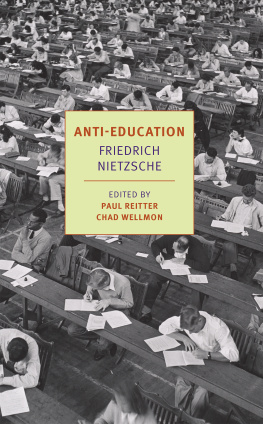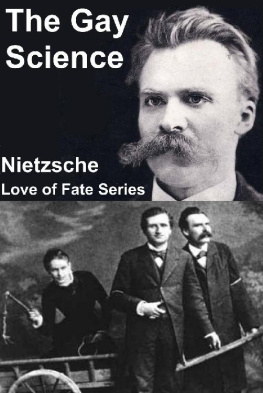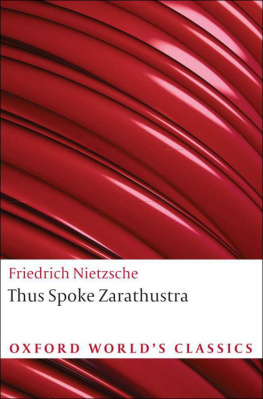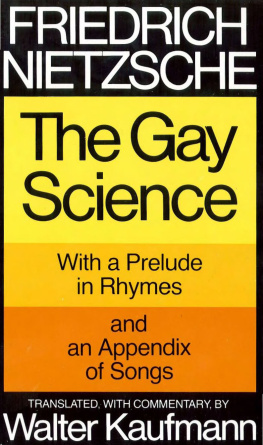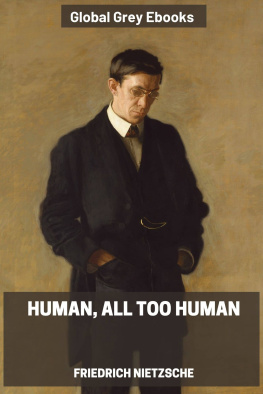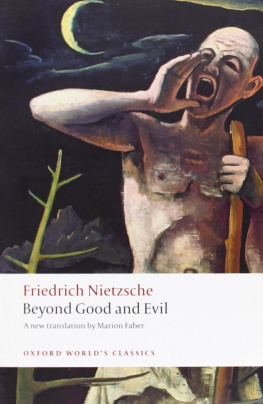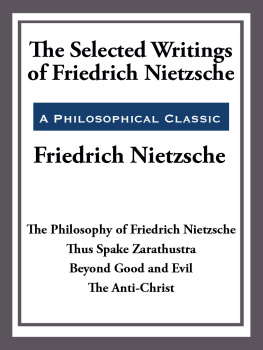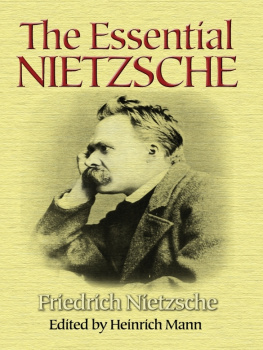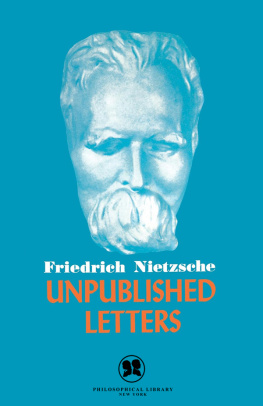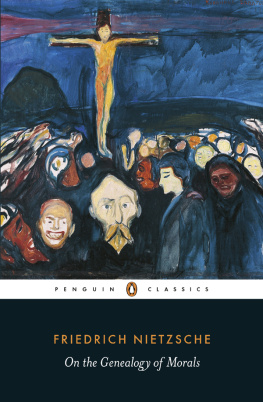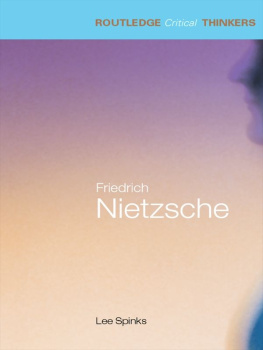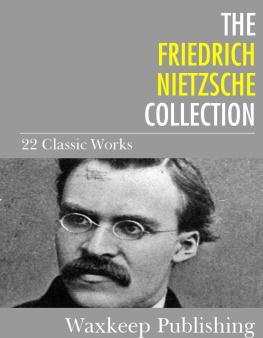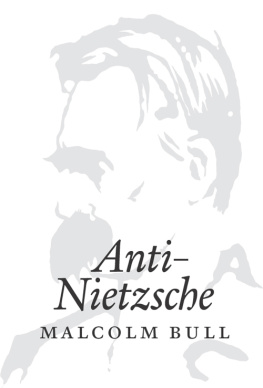
FRIEDRICH NIETZSCHE (18441900) was born in Rcken bei Ltzen, a farming town outside of Leipzig, to a long line of Lutheran ministers. After his fathers early death from a brain disease, the family relocated to Naumburg an der Saale. Nietzsche attended the Schulpforta boarding school, where he became enamored with the music of Richard Wagner and the writings of the German Romantics, before going on to study at the Universities of Bonn and Leipzig. As a university student, Nietzsche gained a reputation as a classical philologist and discovered Arthur Schopenhauers The World as Will and Representation, the cadaverous perfume of which would hang over him throughout his career. After a period of compulsory military service, Nietzsche was appointed to the faculty of the University of Basel at the age of twenty-four. He published his first book, The Birth of Tragedy, in 1872, but his deteriorating health soon forced him to retire from academia. In the itinerant period that followed, Nietzsche completed his most influential works, including Thus Spoke Zarathustra (188385), Beyond Good and Evil (1886), and The Antichrist (1888). He suffered a mental breakdown in Turin on January 3, 1889purportedly at the sight of a horse being beaten by a coachman. Before collapsing, Nietzsche is said to have thrown his arms around the horses neck to shield it from the whip. Three days later, he wrote in a letter to his mentor Jacob Burckhardt that he would rather be a Basel Professor than God. He was subsequently hospitalized, and lived the rest of his life an invalid in the care of his mother and sister.
DAMION SEARLS has translated many classic twentieth-century writers, including Marcel Proust, Rainer Maria Rilke, Elfriede Jelinek, Christa Wolf, Hans Keilson, and Hermann Hesse. For NYRB Classics, he edited Henry David Thoreaus The Journal: 18371861 and has translated Nescio, Robert Walser, Patrick Modiano, Alfred Dblin, and Andr Gide. He is currently writing a book about Hermann Rorschach and the cultural history of the Rorschach test.
PAUL REITTER is a professor of Germanic languages and literatures and the director of the Humanities Institute at Ohio State. His work has appeared in Harpers Magazine, Bookforum, The Paris Review, The Nation, and The Times Literary Supplement as well as in various scholarly journals. He is the author of three books, and recently collaborated with Jonathan Franzen and Daniel Kehlmann on The Kraus Project.
CHAD WELLMON is an associate professor of German studies at the University of Virginia and a faculty fellow at the Institute for Advanced Studies in Culture. He is the author of Becoming Human: Romantic Anthropology and the Embodiment of Freedom and Organizing Enlightenment: Information Overload and the Invention of the Modern Research University and edits the blog Infernal Machine.
ANTI-EDUCATION
On the Future of Our Educational Institutions
FRIEDRICH NIETZSCHE
Translated from the German by
DAMION SEARLS
Edited and with an introduction and notes by
PAUL REITTER and
CHAD WELLMON
NEW YORK REVIEW BOOKS

New York
THIS IS A NEW YORK REVIEW BOOK
PUBLISHED BY THE NEW YORK REVIEW OF BOOKS
435 Hudson Street, New York, NY 10014
www.nyrb.com
Translation copyright 2016 by Damion Searls
Introduction and notes copyright 2016 by Paul Reitter and Chad Wellmon
All rights reserved.
Cover photograph: John Gutmann, Huge Class in Final Exam, University of California at Berkeley, 1947 (detail); collection Center for Creative Photography, University of Arizona 1998 Arizona Board of Regents
Cover design: Katy Homans
Library of Congress Cataloging-in-Publication Data
Nietzsche, Friedrich Wilhelm, 18441900, author.
[uber die Zukunft unserer Bildungsanstalten. English]
Anti-education / by Friedrich Nietzsche ; introduction and annotation by Paul Reitter and Chad Wellmon, translated by Damion Searls. 1 online resource. (New York Review Books classics)
Description based on print version record and CIP data provided by publisher; resource not viewed.
ISBN 9781590178959 () ISBN 9781590178942 (alk. paper)
1. Nietzsche, Friedrich Wilhelm, 18441900. 2. EducationPhilosophy. 3. Educational changeGermany. I. Title.
LB775.N547
370.1dc23
2 015029729
ISBN 978-1-59017-895-9
v1.0
For a complete list of titles, visit www.nyrb.com or write to:
Catalog Requests, NYRB, 435 Hudson Street, New York, NY 10014
CONTENTS
INTRODUCTION
I N J ANUARY 1869, when he was just twenty-four and a long way from having completed his dissertation, Friedrich Nietzsche was offered a peach of a joba professorship in classical philology at the University of Basel, where standards for employment were looser than at its German counterparts. [] Nietzsche was delighted, so much so that upon learning the good news, he broke into song and spent the rest of the day singing melodies from Tannhuser, his favorite opera. The position did have what some scholars might have considered a drawback. On top of teaching eight hours a week at the university, Nietzsche would be required to give an additional six hours of instruction at a local gymnasium. But this wouldnt be a problem, he told his doctoral adviser, Friedrich Ritschl, one of Germanys most renowned classicists. Ritschl passed that message on to the hiring committee, along with his imprimatur, and the appointment was made.
Its likely, then, that when Nietzsche set off for Basel, Ritschl felt confident he had helped launch another brilliant academic career. Yet only a year later, Nietzsche had begun to move away from the kind of philological work that had led his mentor at the University of Leipzig to call Nietzsche the most precocious student he had ever seen: studies on Diogenes Laertiuss account of ancient philosophers, contributions to an Aeschylus lexicon, and so on. Furthermore, Nietzsche had started to show signs of deep disillusionment, different from the ambivalence toward academia that he had felt as a student. For all his excitement upon receiving the offer from Basel, he had already been wondering whether the discipline at which he excelled was right for him.
Arthur Schopenhauer was one of Nietzsches lodestars during his student years, and academic writing, compared to Schopenhauers, seemed dead. In the autumn of 1867, Nietzsche outlined an essay which he would never completeon Democritus and the history of literary studies in antiquity and modernity, with the goal of impressing upon the philologists a number of bitter truths. []
The plan came to fruition in On the Future of Our Educational Institutions. In a series of five lectures held at Basels city museum between January and March 1872, Nietzsche took aim at all of Germanys chief institutions of postprimary learning: the Realschule, the gymnasium, and the university. []
From his student days to his last writings, Nietzsche combined a reverence for the classical world, construed in his own idiosyncratic manner, with a skepticism toward modern society. But if there is much continuity to this line of thought in his works, it also evolved over time. What the lectures addwhat begins with themis a specific and striking critique of the role of German educational institutions in debasing antiquity and modern culture more broadly. In On the Future of Our Educational Institutions, philology and the culture of nineteenth-century German scholarship, or

